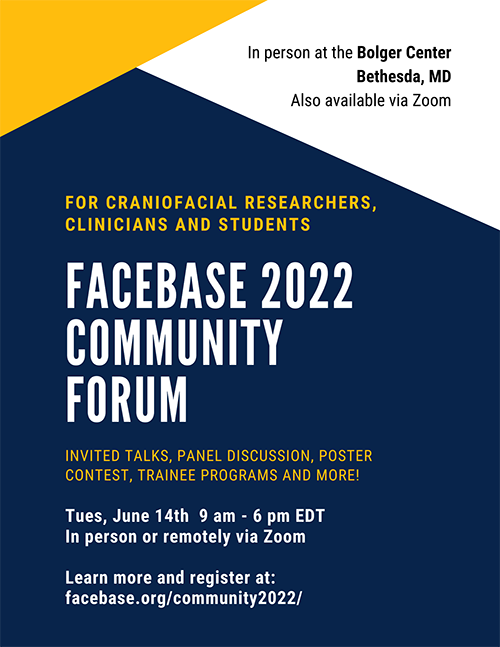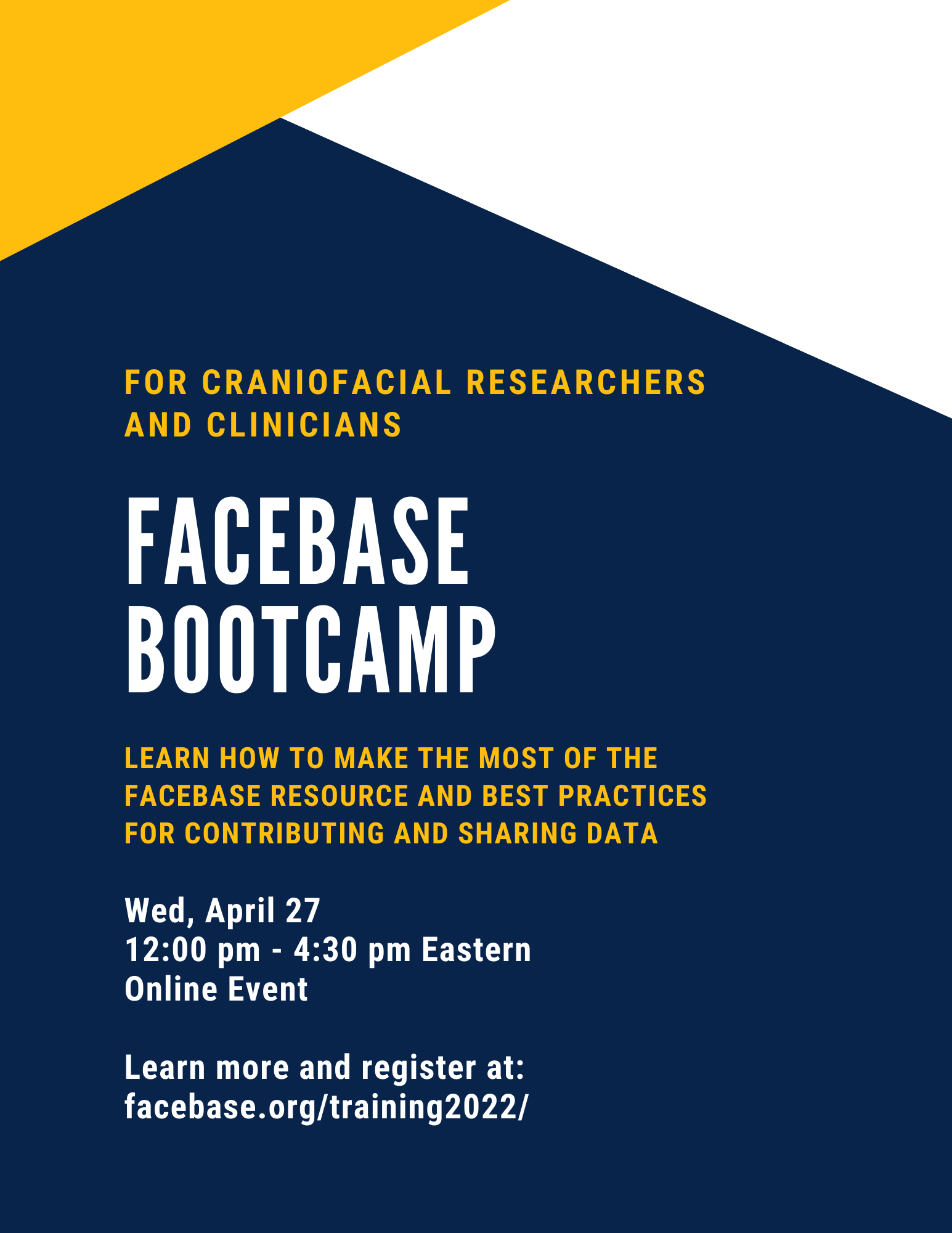News & Events
Save the date for the 2nd Annual FaceBase Community Forum on Tuesday, June 14th! (13 April 2022)
Join the craniofacial research community for a day of in-person and virtual knowledge sharing at the 2nd Annual FaceBase Community Forum!
This year, we’ll be holding the Forum in-person at the Bolger Center in Bethesda, Maryland on Tuesday, June 14th. There will be invited talks, a forum panel, poster competition and special trainee programming!
You still have the option to join remotely via Zoom for the main meeting. However, in-person attendees will have access to special demos and workshops before the main meeting and showing their posters in the poster hall.
Registration will open next week and will include more information on fees and logistics for in-person attendance.
Check this event page, your inbox (if you’re a subscriber or member), and our Twitter account next week for the links!
Upcoming FaceBase Bootcamp for Users & Data Contributors on April 27th (24 March 2022)
FaceBase is hosting another bootcamp which includes sessions for both users of FaceBase and those who wish to contribute data. We will also be introducing new features such as imaging data search, an updated imaging data pipeline and annotations capability.
Date and Times
Wednesday, April 27, 2022
12:00 pm to 4:30 pm EDT / 9:00 am to 1:30 pm PDT
Format
The bootcamp has two scheduled tracks - one focused for users and one for data contributors:
- 12:00 pm to 1:30 pm Eastern - Users track - FaceBase will walk through the resources available on FaceBase, best practices for using the search interface, proper citation practices and how to export data.
- 2:00 pm to 4:30 pm Eastern - Data Contributors track - Learn about contributing data and how data is curated along with a live demonstration of adding metadata and uploading data.
Zoom
Zoom details will be emailed to registrants and replay videos will be available after the event.
Details
Just click this link for details and how to register: https://www.facebase.org/training/2022-04-27/
If you have any questions, please send them to help@facebase.org.
Office Hours on Wed, March 30th (14 March 2022)
Are you interested in submitting data but have some lingering questions? Is there data you’re trying to find but aren’t sure where to start?
If you have any questions about submitting your data, requesting controlled-access human data, how to best find certain data, or any other aspect of interacting with FaceBase, please register via Zoom. Once your registration has been approved, you will receive the login information. The registration form allows you to submit your question or topic ahead of time, but if you forget, you can always send it to our contact email at help@facebase.org).
PLEASE CLICK HERE TO REGISTER VIA ZOOM
Wednesday, March 30th
Start: 1:00 pm Eastern / 10:00 am Pacific
End: 2:00 pm Eastern / 11:00 am Pacific
We look forward to talking with you!
February "Office Hours" on Wed, Feb 23rd (14 February 2022)
If you have any questions about submitting your data, requesting controlled-access human data, how to best find certain data, or any other aspect of interacting with FaceBase, please register via Zoom. Once your registration has been approved, you will receive the login information. The registration form allows you to submit your question or topic ahead of time, but if you forget, you can always send it to our contact email at help@facebase.org).
PLEASE CLICK HERE TO REGISTER VIA ZOOM
Wednesday, February 23
Start: 1:00 pm Eastern / 10:00 am Pacific
End: 2:00 pm Eastern / 11:00 am Pacific
We look forward to talking with you!
This month's "Office Hours" will be on Wed, January 26th (05 January 2022)
FaceBase wishes you all a Happy New Year!
Join us for our next Office Hours when you can join and ask questions: about FaceBase, about the process of contributing data to FaceBase, tips for finding particular data you are looking for, or basically any question you might have regarding the FaceBase resource.
To participate, please register via Zoom to receive the login information. You may also submit a question ahead of time when you register or anytime afterward (just send email to help@facebase.org).
PLEASE CLICK HERE TO REGISTER VIA ZOOM
Wednesday, January 26th
Start: 1:00 pm Eastern / 10:00 am Pacific
End: 2:00 pm Eastern / 11:00 am Pacific


